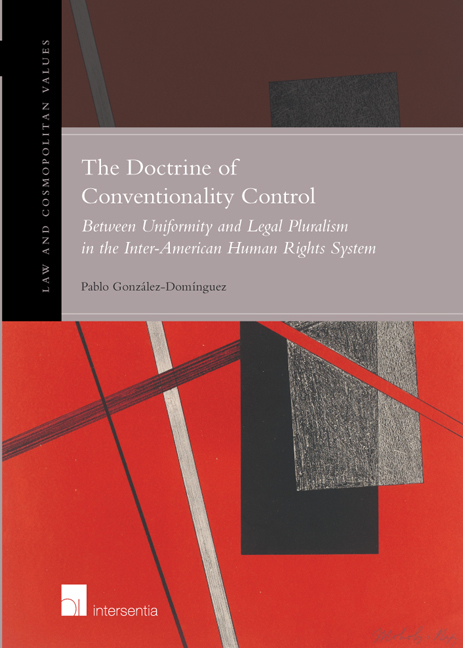 The Doctrine of Conventionality Control
The Doctrine of Conventionality Control Book contents
- Frontmatter
- Foreword
- Acknowledgments
- Contents
- List of Cases and Opinions
- List of Treaties, Instruments and Documents
- General Introduction
- Chapter 1 Jurisprudential Development of the Doctrine of Conventionality Control
- Chapter 2 Legal Analysis of the Doctrine of Conventionality Control
- Chapter 3 Questioning the Legal Validity of the Doctrine of Conventionality Control
- Chapter 4 Reconstructing the Doctrine of Conventionality Control in Light of the Principle of Subsidiarity
- General Conclusions
- Bibliography
- Index
- Miscellaneous Endmatter
- Frontmatter
- Foreword
- Acknowledgments
- Contents
- List of Cases and Opinions
- List of Treaties, Instruments and Documents
- General Introduction
- Chapter 1 Jurisprudential Development of the Doctrine of Conventionality Control
- Chapter 2 Legal Analysis of the Doctrine of Conventionality Control
- Chapter 3 Questioning the Legal Validity of the Doctrine of Conventionality Control
- Chapter 4 Reconstructing the Doctrine of Conventionality Control in Light of the Principle of Subsidiarity
- General Conclusions
- Bibliography
- Index
- Miscellaneous Endmatter
Summary
One of the greatest and most persistent challenges of constructing a global system for the protection of human rights has always been how to bring international norms into a sustainable, healthy relationship with domestic constitutional systems.
It is self-evident that without strong domestic law and institutions, no global system of human rights protection could even aspire to be effective. Just as human rights pervasively get undermined and violated at local levels, so it is that they need to be protected and brought to life “in the small places, close to home,” as Eleanor Roosevelt noted. And it is equally clear that international norms and institutions by themselves, cannot simply substitute for and displace the structures and institutions and habits of local communities in the protection of human rights. Distant, limited in scope and capacity, and detached from the social contexts in which the rule of law and the protection of human rights must take root if they are to be made real, international norms and institutions alone, cannot be the guarantors of human dignity everywhere and for everyone.
Yet, since the mid-twentieth century the nations of the world and their citizens have not been content to leave the demands of human dignity to the uncertain and inconsistent vagaries of domestic authorities. Rather, we have dedicated ourselves to drawing up universal norms of human rights, translating them into positive law backed by institutions, and struggling to establish adherence to and respect for them. The experience of human wrongs, of the most egregious violations of human rights, has taught us all too clearly that local communities, even under the most favorable conditions of the constitutional rule of law, always bear within them temptations to tyranny and abuse. For their own viability and strength, they need the accountability and the constraints that can come from recognized universal standards of human rights.
This inescapable tension has played itself out over the last seven decades in the drafting of treaties and the creation of international courts no less than in the halls of constitutional assemblies and the jurisprudence of high courts around the world. It is necessarily a tension that is permanent and structural to the global protection of human rights. It is constantly open to revision and renegotiation, as dynamic as the shifting sands of law, politics and culture.
- Type
- Chapter
- Information
- The Doctrine of Conventionality ControlBetween Uniformity and Legal Pluralism in the Inter-American Human Rights System, pp. v - viiiPublisher: IntersentiaPrint publication year: 2018


